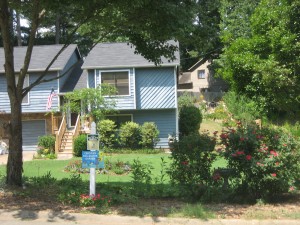Would You Like Your Yard Certified as a “Backyard Habitat?”
The National Wildlife Federation has a “Backyard Habitat” certification process, which isn’t as difficult as you may think.
By providing food, water, cover and places for wildlife to raise their young—as well as incorporating sustainable gardening practices—your garden can join the more than 136,000 Certified Wildlife Habitat™ sites across the country.

You either already have an established garden area or are interested in landscaping your yard to include a garden area or areas. So, why not focus on providing for some of those critters that have been forced out of their natural habit by attracting them into your yard? Yes, this may be a little counter productive to the ownership perspective of “your” garden, but you can live in harmony with Mother Nature’s other inhabitants if you plan for differences of opinion.
The basic certification requirements are for the provision of food, water, cover, and a place to raise their young, while you maintain sustainable gardening practices. You may be accomplishing many, if not all, of these goals already.
You already have some plants. Since plants produce flowers, which produce nectar and seeds, two requirements for food criteria have been filled already. Do you also put out bird feeders or suet cakes? Are you willing to share the bounty from those blueberry bushes?
Your habitat needs three of the following types of plants or supplemental feeders: Seeds from a plant • Berries • Nectar • Foliage/Twigs • Nuts • Fruits • Sap • Pollen • Suet • Bird Feeder • Squirrel Feeder • Hummingbird Feeder • Butterfly Feeder
You provide water for your garden. Do you also have a bird bath, puddling area, or other water feature?
Your habitat needs one of the following sources to provide clean water for wildlife to drink and bathe: Birdbath • Lake • Stream • Seasonal Pool • Ocean • Water Garden/Pond • River • Butterfly Puddling Area • Rain Garden • Spring
Next is cover. Most likely, you already have plants and/or hardscape that provide various forms of shelter?
Wildlife need at least two places to find shelter from the weather and predators: Wooded Area • Bramble Patch • Ground Cover • Rock Pile or Wall • Cave • Roosting Box • Dense Shrubs or Thicket • Evergreens • Brush or Log Pile • Burrow • Meadow or Prairie • Water Garden or Pond
If you have a birdhouse or two, mature trees, and/or dense shrubbery, you have the next requirement pretty well covered.
You need at least two places for wildlife to engage in courtship behavior, mate, and then bear and raise their young: Mature Trees • Meadow or Prairie • Nesting Box • Wetland • Cave • Host Plants for Caterpillars • Dead Trees or Snags • Dense Shrubs or a Thicket • Water Garden or Pond • Burrow
The final criteria is for sustainable garden practices. The odds are in your favor here also. It’s a pretty sure bet that you already use compost and mulch.
You should be doing two things to help manage your habitat in a sustainable way.
Soil and Water Conservation: Riparian Buffer • Capture Rain Water from Roof • Xeriscape (water-wise landscaping) • Drip or Soaker Hose for Irrigation • Limit Water Use • Reduce Erosion (i.e. ground cover, terraces) • Use Mulch • Rain Garden
Controlling Exotic Species: Practice Integrated Pest Management • Remove Non-Native Plants and Animals • Use Native Plants • Reduce Lawn Areas
Organic Practices: Eliminate Chemical Pesticides • Eliminate Chemical Fertilizers • Compost
If you’d like to know more about the National Wildlife Foundation, their Home Page is at: http://www.nwf.org/
If you’d like to go directly to the Certify Your Wildlife Garden page, the link is:
http://www.nwf.org/gardenforwildlife/certify.cfm?campaignid=WH10ANWF
What does this cost? The application fee is $20. If you would like to purchase the “Certified Wildlife Habitat yard standard sign, that’s an additional $30. Your membership includes the certificate, a year’s subscription to the National Wildlife magazine, a quarterly e-newsletter, and your name listed in NWR’s National registry. The real value is much more intrinsic with the knowledge that you have replaced something that was taken from the environment and the cycle of nature and that you may inspire others to do the same.
Are there other programs out there also? Yes. To name a few:
- Monarchs Across Georgia: http://www.monarchsacrossga.org has “Pollinator Habitat Certification” program.
- The North American Butterfly Association: http://www.naba.org/ has a “Butterfly Garden Certification” program.
- The North American Pollinator Protection Campaign site is available at http://www.nappc.org
- The National Arbor Day Foundation http://www.arborday.org/ also provide information to assist in the choice of new trees for your landscape.
- The Fish and Wildlife Service has resource information available at http://www.fws.gov/southeast/ea/funfacts.html
Teri Nallett-Carmine is a 2011 MG Intern
